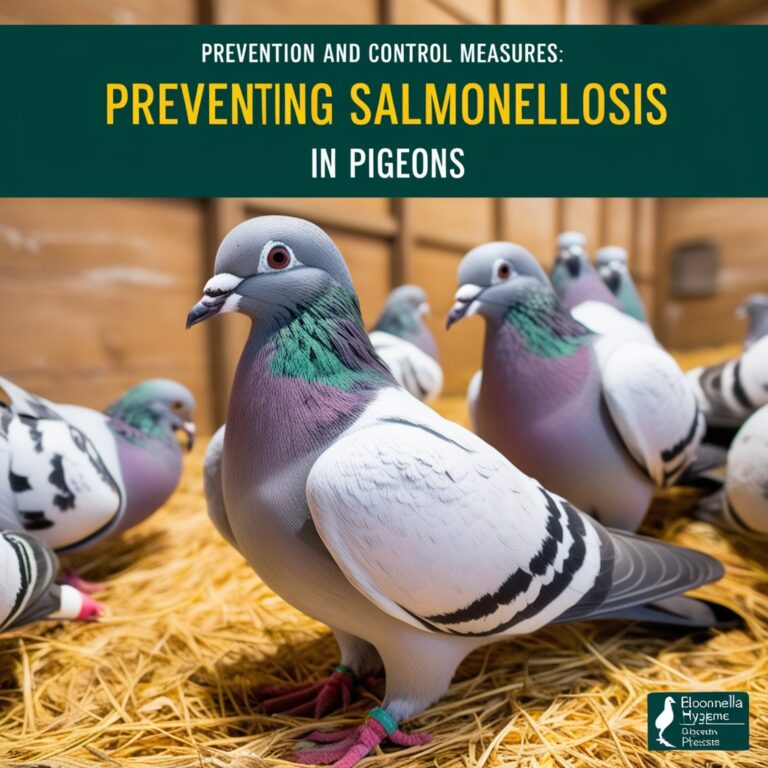Prevention and Control Measures
Biosecurity Practices
- Quarantine New Birds: Always isolate new pigeons for at least 30 days before introducing them to your existing flock. This practice helps identify any signs of illness and prevents the spread of diseases.
- Hygiene: Regularly clean the loft or living area to minimize the accumulation of droppings and debris. Daily removal of waste reduces the risk of infections.
- Disinfect Equipment: Use bird-safe disinfectants to clean feeding and watering equipment, ensuring that pathogens are minimized and preventing cross-contamination.
2. Nutrition and Diet Management
- Balanced Diet: Provide a well-balanced diet consisting of high-quality grains, seeds, and necessary supplements. This will enhance the birds’ immune systems and overall health.
- Fresh Water: Ensure that fresh, clean water is available at all times. Regularly clean water dispensers to prevent contamination.
3. Vaccination Protocols
- Regular Vaccinations: Work with a veterinarian to establish a vaccination schedule for your pigeons. Vaccines can protect against common diseases, such as paramyxovirus and pigeon pox.
- Boosters: Keep track of booster vaccinations to ensure ongoing protection for your flock.
4. Monitoring and Early Detection
- Regular Health Checks: Conduct routine health checks to identify any signs of illness early. Monitor for symptoms such as lethargy, changes in appetite, or abnormal droppings.
- Weight Monitoring: Regularly weigh your pigeons to ensure they are maintaining a healthy weight. Sudden weight loss can be a sign of health issues.
5. Environmental Controls
- Ventilation: Ensure proper ventilation in the living space to reduce moisture and prevent respiratory issues. Good airflow helps to minimize the growth of harmful pathogens.
- Temperature Regulation: Protect pigeons from extreme weather conditions. Provide adequate shelter and warmth, particularly for young birds and during cold months.
6. Pest Management
- Control Pests: Implement pest control measures to minimize the risk of diseases carried by rodents and insects. Regularly check for signs of pests and take appropriate actions to eliminate them.
7. Education and Awareness
- Stay Informed: Keep yourself updated on common diseases affecting pigeons and best care practices. Attend workshops or join pigeon fancier groups to learn from others’ experiences.
- Veterinary Resources: Establish a good relationship with a veterinarian who specializes in avian care. Having a professional on hand for guidance and emergencies can be invaluable.

Quarantine New Birds
When incorporating new pigeons into your existing flock, it is essential to quarantine them for a minimum of 30 days. This practice allows you to monitor the new arrivals for any signs of illness, thereby reducing the risk of transmitting diseases to your established birds. Quarantine helps ensure the health of your entire flock by acting as a preventative measure against potential outbreaks.
4.2 Limit Exposure
To safeguard your pet pigeons from diseases, it’s important to minimize exposure to wild birds. These birds can carry various pathogens that may adversely affect your pigeons. If feasible, keep your pigeons indoors or in a secure aviary to limit their interaction with outside birds. This strategy is particularly effective in maintaining a healthy environment for your pets.
5. Parasite Control
5.1 Regular Inspections
Conduct routine inspections for parasites, such as mites, lice, and worms. Look for signs of infestation, including feather loss, excessive scratching, or changes in behavior. Regular checks allow for early detection and prompt treatment, helping to maintain your pigeons’ health.
5.2 Treatment Options
If you discover any parasites, it is vital to consult your veterinarian for appropriate treatment options. In addition, regularly clean and disinfect your pigeons’ living environment to prevent re-infestation. This includes sanitizing perches, nesting areas, and feeding equipment to eliminate any remaining parasites or eggs.
6. Stress Management
6.1 Provide a Comfortable Habitat
Creating a comfortable habitat is essential for the well-being of your pigeons. Ensure they have safe and adequate perches, nesting areas, and enrichment activities to help reduce stress. A stimulating environment contributes to the overall happiness and health of your birds.
6.2 Minimize Loud Noises and Sudden Changes
Pigeons are sensitive creatures and can be easily affected by loud noises and sudden changes in their surroundings. To foster a calm atmosphere, limit disturbances and introduce changes gradually. This approach helps to create a stable environment, promoting mental well-being and reducing stress among your pigeons.

-
Proper Health Monitoring and Early Detection for Pet Pigeons
Maintaining the health of pet pigeons involves careful monitoring and early detection of symptoms. By being vigilant and implementing preventive care, pigeon owners can minimize the risk of disease and ensure their birds remain healthy.
1. Monitor for Symptoms
Regular observation is essential for identifying potential health issues in pigeons. Key signs to watch for include:
- Lethargy: A pigeon that appears less active or isolates itself from the rest of the flock may be showing early signs of illness.
- Coughing or Sneezing: Respiratory infections, such as mycoplasmosis, are common and often manifest through coughing, sneezing, or nasal discharge.
- Diarrhea: Loose or discolored droppings, particularly if foul-smelling, can indicate digestive problems such as salmonellosis or canker.
- Weight Loss: Sudden weight loss or a noticeable decrease in appetite can signal various health concerns, including infections or parasite infestations.
2. Test for Diseases
Testing new pigeons before adding them to your flock is a critical preventive measure, especially if they originate from unfamiliar sources. Common diseases to test for include:
- Paramyxovirus: A highly contagious viral disease that can impact the nervous system and may be fatal.
- Canker (Trichomoniasis): A parasitic infection that causes yellow growths in the mouth and throat of affected pigeons.
- Salmonellosis (Paratyphoid): A bacterial infection affecting both the digestive and nervous systems.
Consult with a veterinarian regarding specific testing protocols and vaccines to protect your flock.
3. Nutrition and Feeding
A balanced diet is crucial for maintaining a pigeon’s immune health. Proper nutrition can help pigeons resist illness and recover effectively from stress or disease.
3.1 Grains and Seeds
Pigeons thrive on a diverse diet of grains and seeds, which provide essential carbohydrates, proteins, and fats:
- Corn: A high-energy grain that is particularly beneficial during colder months for maintaining body heat.
- Wheat and Barley: These grains are rich in vitamins and minerals, making them especially useful during molting season when pigeons need extra nutrients for feather regeneration.
- Peas and Beans: Excellent protein sources, vital for breeding pigeons or those recovering from illness.
3.2 Vitamins and Supplements
Adding supplements to the diet ensures pigeons receive necessary nutrients:
- Calcium: Essential for strong bones and egg production; particularly important for breeding females.
- Probiotics: Important for maintaining a healthy gut microbiome, which supports digestion and boosts immunity, especially during stress.
- Grit: Necessary for aiding digestion, grit helps break down food in the gizzard, enhancing nutrient absorption.
3.3 Fresh Water Supply
Providing a constant supply of fresh, clean water is vital for health. Ensure water dishes are cleaned daily to prevent contamination from droppings or food, which can lead to bacterial spread. Replace water more frequently during warm weather or periods of increased activity to prevent dehydration.
4. Monitoring and Early Detection
Regular monitoring of your pigeons is crucial to prevent disease outbreaks and ensure flock health.
4.1 Weight Monitoring
Weighing pigeons regularly allows for early detection of weight loss, which may indicate illness or nutritional deficiencies. Consistent weight checks can highlight subtle changes before visible symptoms appear.
4.2 Behavior Observation
Observe any changes in behavior, such as decreased activity, abnormal posture, or aggression. Pigeons that become antisocial or overly aggressive may be experiencing illness or stress.
4.3 Check Droppings
Frequent checks of droppings can provide insights into health. Changes in color, consistency, or odor may indicate digestive issues or infections. For example, diarrhea can signal a bacterial or parasitic infection.
4.4 Feather and Skin Checks
Regular examinations for feather damage, skin lesions, or unusual feather loss can reveal signs of parasite infestations or nutritional deficiencies. Consistent checks enable early detection and prompt treatment.

-
5
Prevention through Quarantine and Vaccination
Implementing preventive measures is essential for maintaining a healthy flock of pet pigeons and minimizing the risk of disease spread.
5.1 Quarantine New Birds
When introducing new pigeons to your flock, it’s crucial to quarantine them for a minimum of 30 days. This period allows you to monitor the newcomers for any signs of illness. During this time:
- Observation: Keep a close eye on the new birds for symptoms such as lethargy, coughing, sneezing, or abnormal droppings.
- Veterinary Consultation: If any symptoms arise, consult with a veterinarian for appropriate testing. This proactive approach helps prevent potential disease outbreaks within your established flock.
5.2 Vaccination Programs
Vaccination is a vital strategy for protecting your pigeons from common diseases. It’s essential to establish a vaccination schedule based on your veterinarian’s recommendations. Key vaccinations to consider include:
- Paramyxovirus: A highly contagious viral disease that can lead to severe neurological issues in pigeons.
- Pigeon Pox: A viral infection that causes lesions and can impact overall health.
- Other Infectious Diseases: Discuss additional vaccinations based on your local environment and the specific risks your pigeons may face.
Hygiene and Biosecurity
A clean and secure living environment is critical for the health and safety of your pet pigeons. Implementing proper hygiene and biosecurity measures can help prevent disease transmission.
6.1 Regular Cleaning
Maintaining a clean living space is vital to prevent the buildup of harmful bacteria, parasites, and mold. This includes:
- Cages: Clean and disinfect cages regularly to remove droppings and debris.
- Perches: Ensure perches are scrubbed and sanitized to eliminate any potential pathogens.
- Feeding Stations: Regularly clean feeding and watering stations to prevent contamination and keep food fresh.
6.2 Limit Exposure to Wild Birds
Wild birds can carry various diseases that pose a risk to your pet pigeons. To reduce this risk:
- Enclosed Areas: Keep your pigeons in secure lofts or enclosed aviaries to minimize contact with wild birds.
- Food and Water Access: Prevent wild birds from accessing your pigeons’ food and water supplies, as this can be a source of disease transmission.







